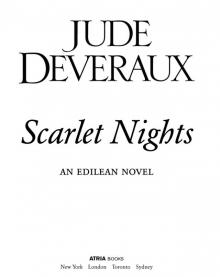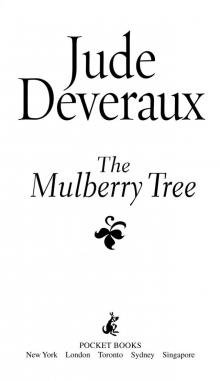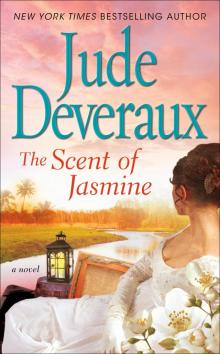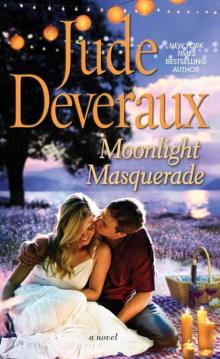- Home
- Jude Deveraux
The Black Lyon Page 7
The Black Lyon Read online
Page 7
Her horrible dying words came to him. “I am glad she is dead, because I am dying also and I would take all from you that I could. I loved a man once, Leah’s father, but he was poor and my father would not have him. You were there with all your riches and all your men, and you took away the one I loved. Do you think I could ever bear your black ugliness, that any woman could? No, Ranulf de Warbrooke, no woman will ever love aught about you but your fine furs and gold cups. Go now and get a priest and never let me need to look on your devil’s blackness again.”
He crumbled the silver cup he held, jewels flying about the room, blood-red wine covering his hand. He should not have betrothed himself again! There were too many likenesses between this marriage and the other—a father eager to have an earl for a son, a girl… He sat down again.
No, there were no similarities between Isabel and Lyonene. But what of this young girl? She had seemed to feel the same for him as he for her, yet he had never felt so for another. For what he knew, she could have treated many men before him with the same eagerness, the same desire.
The storm grew worse and his temper with it. It seemed that his every memory of his betrothed pointed to some falseness, some deceit.
Hodder found his master asleep in the solar the next morn, and when he was awakened, the blackness of his mood matched his coloring. The thin valet watched his lord grow steadily worse in temper each day, eating little, drinking over much, remaining unwashed, unshaven.
The rain continued, wetting everything, seeping into crevices and dulling moods. It was with joy that Corbet greeted the sun on the day they were to leave for Lorancourt. The seven men were ready and waiting in the courtyard for their master, but he did not come.
Hugo Fitz Waren, oldest of the Black Guard, sought him out.
“My lord, the sun is high. We must make haste to reach Lorancourt for the marriage.”
“I do not go. I will send Sir William wagons of gold to repay him, but I do not marry again.”
Hugo sat on a stool at Ranulf’s feet and tried to control his gasp at the sight of his master. “So the great Black Lion fears a girl half his age and less than half his size? And what will you send the girl to compensate her for the loss of the husband she loves?”
“Do you not know the Earl of Malvoisin is too rich to ever be loved?”
“He is not too rich to wallow in his own pity. You may look at me so, but I do not fear you. I know of this other wife of yours.”
“Do not speak of her to me.”
“Until I am forcibly silenced, I will speak. You cannot blame all women for the faults of one.”
“They are alike, these wives of mine.”
“They are somewhat akin, I agree, both being baron’s daughters. You are a man of honor and have not seen the girl for some time. When you see her again you will forget your fears.” Hugo leaned closer and saw his master was no little drunk.
“Hodder! Throw some clothes on your master. We go to Lorancourt and return with a wife. Be sure his wedding garments are packed.”
It was a tired, confused Ranulf who rode north to Lorancourt. His head ached and his stomach burned, but it was all better than thinking and hearing the voices that haunted him.
Chapter Five
Lyonene looked at the rays of the early sun as they slanted across the rush-covered floor. She had been ready for what seemed to be hours now. Her betrothed and the men from Malvoisin had arrived yester eve, and there were many baths to ready before they were presentable for the wedding. She had not seen Ranulf.
Meg rushed into the little room. “You look lovely, my lady.”
Lyonene smiled at her, feeling as if her stomach might leave her at any moment. “What is that you carry?”
The girl gasped. “It is from his lordship, the great black one, your…”
“Let me see. It is for me, is it not?”
“Oh, yes, and lovely it is, too.”
Both Melite and Lyonene gave her a harsh look for opening a gift meant for another. Meg handed the box to her young mistress carefully, with reverence.
It was long and thin and covered with sheets of ivory on all sides and top and bottom. Each flat area, six in all, was covered with scenes of courtly love, a man and woman together. “It is lovely,” Lyonene gasped.
“No! Open it; the true gift is inside.”
Astonished that there could be more than the beautiful box, Lyonene lifted the lid on its silver hinges. The lion belt gleamed and the emeralds sparkled. Melite took the box as her daughter studied the tiny lions and lionesses. “I have never seen such as this,” she whispered. She held it to the light, feeling the thin gold wire, the smooth pearls and enamels. “Is it not lovely?”
Melite smiled at her daughter, glad to see such happiness. “It is indeed lovely. Now fasten it or we shall miss your wedding.”
Lovingly, Lyonene put the belt about her waist and let it fall just to the top of her hips. She caressed it and felt she could not take her eyes from it. “Did you send my husband my cups?”
“Aye, my lady.”
The hand that William took as he led his daughter down the stairs was trembling. He helped her onto the pretty little mare. She was to ride sidesaddle for the auspicious occasion; the rest of her family and important castle retainers followed on foot. William led the horse the short distance to the castle chapel. The day was cold and clear, and the ceremony would be held outside the church door, marriage as yet considered a legal matter and not completely a holy one.
Lyonene smiled to see the two brothers side by side. They both wore the Malvoisin black and green. The younger brother was in green with a trim of black and a mantle lining of white fur; the older brother wore black with a thin green braid about the edges of his tabard, his mantle lined in the rich black sable. Her father helped her dismount.
The look Ranulf gave her almost frightened her. He was not at all as she remembered. He seemed to frown at her and not be glad to see her. There were circles under his eyes.
Father Hewitt asked who gave the woman in marriage and who took her. Her father relinquished her arm and she took Ranulf’s, but he did not look at her. She wanted some reassurance that he was the same man she’d betrothed.
The priest’s questions were answered and the doors to the church thrown open. She released her pent-up breath and pulled on Ranulf’s arm until he looked down at her. He looked tired, but he was her Lion. She smiled up at him. “You ever forget when you are to kiss me,” she whispered.
He gave her a faint smile and bent slightly toward her.
“It is too late now, for now Father Hewitt must bless our marriage.”
As they knelt before the altar for the wedding mass, she was more aware of some change in her husband, a change not caused by mere lack of sleep. The long ceremony ended, and they were once again in the early morning sunlight.
Ranulf lifted Lyonene into the broad saddle of the Frisian and mounted behind her, his arms encircling her to hold the reins, while the wedding guests threw sundry grains at them and called, “Plenty! Plenty!”
“Ride with me now, away from here, to Malvoisin.” His breath was soft in her ear.
She turned in his arms. “I ever beg you to kiss me and you refuse, yet now you wish to carry me off and neglect our guests.”
The reins were dropped as he pulled Lyonene to him, crushing her against him. It was not a sweet kiss, but one from the longing, the doubt he still held.
She leaned against him, her arms yet about his neck.
“Go with me now,” he urged.
“I cannot. I could not think only of myself.”
“Do but think of me then.”
She looked into his eyes and saw the pain there. “On the morrow all my days will be yours, but this one belongs to my parents. Come, there will be dancing and we have cooked for days.”
“And will there be many men guests?”
“Of a surety, but women also. Ranulf, what is wrong? Has some misfortune befallen you? You do not smile at m
e.”
“Do you not know the Black Lion never smiles?”
She could not help the shudder that passed through her. It was as if another man occupied the form of the man she had learned to care for. “Let us go now. I do not care for the others. Let us ride now to your island.”
“Nay.” His voice was cold. “You have chosen the others, so let it be. It is not for me to ever deny a wife.”
She leaned back against him and felt him stiffen, and she was frightened by his action as much as by his words.
The old donjon of Lorancourt was decorated with serge bunting, the black and green of Malvoisin, and a great feast had been prepared. There was a large white swan, baked and dressed and then reassembled so that it looked almost alive, every feather repositioned perfectly. There was a roast boar stuffed with rabbits that were stuffed with partridges. Pies of every type covered the white tablecloths.
There were many who raised their cups and drank to the health of the young couple.
“Ranulf, you look tired. Are you so unhappy at this marriage?”
His eyes showed no humor. “I have yet to see what I have married.”
She blinked to control the tears that came to her eyes. “The belt is most beautiful. I thank you for it.”
He barely nodded to her and drank deeply of his wine.
Lyonene sat quietly, unaware of the noise or the many people around her. Where was the man she remembered, the laughing man who had teased her and held her? “Can you not tell me how I have displeased you so?”
He softened toward her somewhat and touched her cheek with the back of his fingers. “I am a vile-tempered man and ’tis no fault of yours. Mayhaps we could leave this for a while and find some place to be alone.”
“No more of that!” a voice called to them. “You will have a lifetime of her, and for the rest of us, we must mourn her loss.” It was Sir John de Bano, a near neighbor, a man Lyonene had known all her life.
She smiled up at him.
“Lady Lyonene must show us this blasted Irish game of trucks. William can never remember the rules and neither can I. If Giles had come, he could tell us, but he has not.”
“You will come and play the game with us?” she asked Ranulf. “It is a most unusual game and requires great skill.”
“Nay, I am not in a mood for games. Go with them since you seem to enjoy their company.”
She started to tell Sir John she would not leave her husband when the older man pulled her arm, motioning for her to come.
“Do not fret,” the man told her when they were alone. “I was just so at my wedding. Scared me half to death. I knew all my life had ended. I felt Maggie to be a stranger, although I had known her for years. Now come along and show us this cursed game and enjoy yourself! He will recover by himself.”
“I hope you are right, but he seems a different person from the one I met.”
“And he is. He is a husband now and not a carefree bachelor.”
“If that is so, then I should have run away with him and not married him.”
Sir John gaped at her. “You are like a daughter to me and I at times thought you were to be one, so I will do a father’s duty and tell you not to speak so again but to Father Hewitt. Your words are a sin, and you must repent them.”
She lowered her head so he could not see her eyes. “Yes, Sir John.”
“Good. Now come along to the trucks table.”
Lyonene could not enjoy the game or any of the merriment, for her eyes always strayed to the silent Ranulf, who joined in nothing and only sat and drank. Each time she tried to approach him, she was laughingly whisked away to a far side of the hall. Only Geoffrey talked to Ranulf, for the other guests were very aware of his status as one of the king’s eleven earls.
The tables were set for supper and the free-flowing wine, ale, beer, verjuice, must and metheglins added to the already high spirits of the guests.
“You are enjoying yourself?” Ranulf made the question seem like an accusation.
“I will find a way to slip away to the garden. You will meet me there?”
“I could not deprive you of your beloved guests.”
“Please, my Ranulf, I do not know the cause for your anger. I pray you to tell me that I may not displease you more.”
More words were impossible, for just then the band that played from the balcony surrounding the Great Hall tripled its sound and the room filled with loosely clad dancing girls. The guests roared their approval, and the tables were quickly cleared so the guests could join the dancing.
The dances fit the temperament of the people, now filled with drink and food, for they were rowdy, energetic and romping. Lyonene found herself flung from the arms of one man to another. She was breathless from the fast-paced dances.
“So now you have sold yourself to be a countess.” It was Giles, Sir John’s son, and by the color of his eyes, he had been drinking heavily.
“Release me, Giles! How dare you come here in this condition!”
He held her wrists and pulled her into a dark window seat set in the six-foot thick stone walls. “You are the one who dares! What does your new husband say of us?”
“Of us?” She was incredulous. “There is naught to say of us. I have known you since we were children, ’tis all.”
“What of our talk of marriage?”
“Our talk of marriage was about who we would marry, and when. We did not speak of marriage to each other.”
“Did you not know I always meant my wife to be you?”
“Giles! You are hurting me!” He did not loosen his grip. “You have had overmuch to drink. Go home and sleep, but do not say more of these false things to me.”
“False! You call my love for you false? What is it you love most about him, his gold or his earldom? Does it please you to be a countess?”
Although it hurt her toe through the soft leather slippers, she kicked his shin with all her might. The surprise made him relinquish his hold enough that she escaped him. She near ran to Ranulf’s side.
“Do not say to me you grow tired of the attentions of so many guests who have fallen to your charms.”
She turned on him and curled her upper lip in a snarl, then left him. She made her way to the door of the hall and went below to the cold winter garden. The coldness of a dark stone bench felt good, for her temper boiled in her.
Her wedding day! Meant to be a most happy occasion, it had turned into a disaster. A husband who had changed into a scowling stranger, a childhood friend turned to a drunken madman. She wished with all her heart she could ride away and leave them all.
“So, you cannot bear his presence even for one day. You have paid a high price for your silks and velvets.”
“Do not come near me, Giles, What you talk of is nonsense. I have never loved you or ever thought to marry you. I marry Ranulf because he is a good and kind man, for no reasons of wealth.”
“You say to me the Black Lion is good and kind when all of England knows of his character? Next you will tell me he is a laughing boy who loves you well.”
“I tell you naught of my husband.” She turned back to the castle, but he caught her wrist. The slap she placed on his cheek made his ears ring. She picked up her skirts and began to run, but his sobs stopped her. Giles had once been her friend and now she could not bear the terrible sounds of his pain. She turned back to him.
“Giles, do not take on so. I did not know of your feelings for me. You have ever been my friend.”
He grabbed her arms, his head lightly resting on her shoulder. “I have always loved you, always.”
She patted his arm lightly, but pressed him away.
“A most touching scene.” They both turned to Ranulf, who stood a few feet from them, and the hate in his voice made her blood freeze.
An ugly laugh came from Giles. “So, you are the husband, the wondrous earl who can buy himself any bride he chooses. You may think you have won her, but she will always be mine. Do my words reach you? She is mine!�
�
Lyonene did not see Ranulf move, but Giles flew through the air to land with a heavy thud several feet away. He made no more sounds. The look on her husband’s face was terrifying, and she could not move.
“They are here.” A woman’s voice spoke near them. “They could not keep from one another. We have come in time,” she said, laughing.
Soon the cold courtyard was filled with laughing women, who surrounded Lyonene.
“She will be yours soon enough, Lord Ranulf.”
Only Melite noticed her son-in-law’s face. She placed a hand on his arm, but he did not seem to notice, so she followed her daughter.
Lyonene stood as stiffly as a doll while Lucy and her mother removed her wedding garments. Silently she stepped into the six-foot-square bed. Still she did not speak as they pulled the fine linen sheets just across her breasts and placed several feather pillows behind her head. Carefully they arranged her great masses of tawny locks about her head and shoulders.
“She’s lovely, my little girl.” The tears flowed down Lucy’s plump cheeks. “Oh, my lady, I hate to leave her like a lamb to be slaughtered.”
“Hush, Lucy!” Melite commanded. “She is frightened enough as it is. Do not encourage her.”
“And well she should be, too, for they say he’s a spawn of the Devil’s.”
Melite drew herself up, her eyes stormy, and pointed her finger toward the door. Sobbing, Lucy left.
“Lyonene! I have told you what happens between a man and a woman. It is an act of love, and there is no need to fear it so.”
Lyonene lifted her eyes to her mother’s. “I believe he hates me.”
“What has happened? What have you done?”
“I do not know; only that he is more than angry. Giles told him some lies and he hates me for them.”
“Giles! I thought he might cause problems so I asked Sir John to come without his son. I did not even see him.” She looked toward the door. “They come now. Be kind to him and patient; do not let your temper say things. I must go. You are a woman now and must solve your own life.” She kissed her daughter’s cheek and left.

 Eternity
Eternity The Temptress
The Temptress The Taming
The Taming True Love
True Love Forever...
Forever... Lavender Morning
Lavender Morning The Velvet Promise
The Velvet Promise Days of Gold
Days of Gold Temptation
Temptation Counterfeit Lady
Counterfeit Lady Twin of Fire
Twin of Fire Remembrance
Remembrance Velvet Angel
Velvet Angel The Enchanted Land
The Enchanted Land Just Curious
Just Curious Wild Orchids
Wild Orchids First Impressions
First Impressions Wishes
Wishes Twin of Ice
Twin of Ice Ever After
Ever After An Angel for Emily
An Angel for Emily River Lady
River Lady The Invitation
The Invitation Scarlet Nights
Scarlet Nights The Black Lyon
The Black Lyon High Tide
High Tide The Girl From Summer Hill
The Girl From Summer Hill Sweetbriar
Sweetbriar As You Wish
As You Wish For All Time
For All Time Secrets
Secrets The Blessing
The Blessing Upon a Midnight Clear
Upon a Midnight Clear The Mulberry Tree
The Mulberry Tree The Scent of Jasmine
The Scent of Jasmine Sweet Liar
Sweet Liar Carolina Isle
Carolina Isle Holly
Holly A Knight in Shining Armor
A Knight in Shining Armor Always
Always The Duchess
The Duchess Forever and Always
Forever and Always The Raider
The Raider The Conquest
The Conquest Moonlight in the Morning
Moonlight in the Morning The Heiress
The Heiress Stranger in the Moonlight
Stranger in the Moonlight Moonlight Masquerade
Moonlight Masquerade Change of Heart
Change of Heart The Awakening
The Awakening Velvet Song
Velvet Song Someone to Love
Someone to Love The Summerhouse
The Summerhouse The Princess
The Princess Highland Velvet
Highland Velvet A Forgotten Murder
A Forgotten Murder Lost Lady
Lost Lady Met Her Match
Met Her Match LEGEND
LEGEND Forever: A Novel of Good and Evil, Love and Hope
Forever: A Novel of Good and Evil, Love and Hope Scarlet Nights: An Edilean Novel
Scarlet Nights: An Edilean Novel